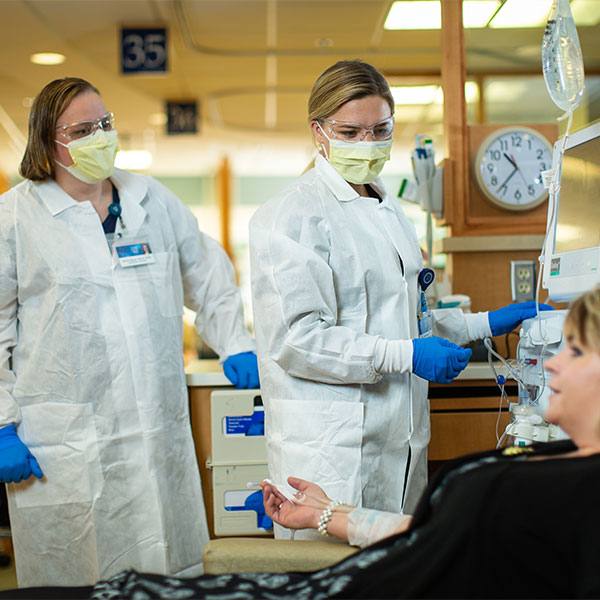-
Biotherapeutics
Regenerative patient consult service seeks to educate patients
Article by Charlene Martin-Lillie and Susan Buckles

Advances in Regenerative Medicine hold promise for many patients as the therapeutic paradigm shifts from treating disease to restoring health. As this evolving field of medicine matures, information becomes increasingly available to the general public through multiple venues, mostly online. Terms such as “stem cells”, “exosomes”, and “regenerative therapy” are prolific on internet searches and could easily be misunderstood. In fact, a Google search of the term “stem cells” alone returns more than 300 million results. How are people who are looking for answers as it pertains to regenerative medicine expected to sift through this information and find trusted data?
Research led by Zubin Master, Ph.D., a bioethicist for the Mayo Clinic Center for Regenerative Medicine, is the first to describe people who seek information on regenerative solutions. The study analyzed data collected by the Mayo Clinic Regenerative Medicine Consult Service, which included information about what types of questions were being asked and the demographics of callers.
The study, “Challenging misinformation and engaging patients: characterizing a regenerative medicine consult service,” published in Regenerative Medicine, finds that a patient consult service is a credible and helpful resource for patients who are seeking information about regenerative therapies, and more generally about the field of regenerative medicine.

“With patients increasingly seeking health information online, the internet is playing an important role in distributing and amplifying scientific and therapeutic information, but some of the claims lack evidence and can mislead patients when considering a regenerative option,” says Dr. Master. “A patient consult service can help inform patients about the science behind regenerative medicine and whether regenerative therapies might provide the right complement to standard of care.”
Mayo Clinic launched the Regenerative Medicine Consult Service to help health consumers find trusted, scientifically-based information about validated regenerative procedures. The goal is to assist patients in finding appropriate regenerative options, as well as educating patients on the current state of the science as it pertains to regenerative therapies and available clinical trials.
Furthermore, Mayo Clinic in Florida developed a consult service that is integrated with the Regenerative Medicine Therapeutic Suites, with a specific emphasis on musculoskeletal conditions. Shane Shapiro, M.D., medical director of the Regenerative Medicine Therapeutic Suites and Jennifer Arthurs ARNP, coauthors on the paper, consult with patients across a broad spectrum of inquiries and often find that patients are not well aware of the fact that there are many regenerative medicine procedures that do not involve stem cells.

“Stem cells have become a buzz word. Sometimes the treatments patients hear or ask about do not contain any actual stem cells but may still be regenerative in nature by using other kinds of cells, cell products and growth factors that help with the healing process,” says Dr. Shapiro.
To date, Mayo’s consult services have provided educational information for over 5,600 patients from the United States and other countries.
The research
Dr. Master’s team analyzed a total of 503 clinical consult notes from Mayo Clinic in Minnesota, as well as demographic information from 1,319 patients from both Minnesota and Florida. Patients looking for regenerative options are health consumers who have typically done a great deal of research on their own to find treatments for their particular medical condition. Many have tried one or more conventional treatments, but did not find relief. Typically, these patients and their families are highly motivated to seek something that can help them.
This group of information seekers was generally over 60 years old and evenly split between male and female. A majority of callers were seeking information about regenerative orthopedic care followed by pulmonary, cardiology and neurology care. The researchers also conducted interviews with 25 patients to find out that most express their appreciation for the consult service, which they found to be informative and helpful. Patients also reported that the Mayo staff members they spoke with were knowledgeable and professional.
Through the Regenerative Medicine Patient Consult Service, Mayo Clinic is able to provide information which patients and health care providers together could determine the best care plan. Both Dr. Shapiro and Dr. Master credit Jennifer Arthurs, advanced practice registered nurse, and Charlene Martin-Lillie, patient educator, for the success of the patient consults. They are often the first points of contact who listen, educate and explain the regenerative and standard of care options.
“Developing trustworthy and evidence-based resources to engage patients seeking regenerative interventions is critical and part of the responsible translation of regenerative medicine. This way we can help patients make informed decisions about their healthcare, especially in the context of medical misinformation.” says Dr. Master.
By analyzing the nature of the consultations, regenerative medicine providers may better understand patient needs and can continue to enhance the consult service to meet those needs.
To learn more about with the Regenerative Medicine Consult Service at Mayo Clinic please call 844-276-2003 to schedule a telephone appointment or (904) 953-0857 to schedule a consult with the Regenerative Medicine Therapeutic Suites in Florida.
###
Other authors on this paper:
Cambray Smith, Mayo Clinic Biomedical Ethics Research Program
Charlene Martin-Lillie, Mayo Clinic Center for Regenerative Medicine
Jennifer Dens Higano, Mayo Clinic Alix School of Medicine
Leigh Turner, Ph.D., Center for Bioethics, University of Minnesota
Sydney Phu, Oregon State University
Jennifer Arthurs, Mayo Clinic Regenerative Medicine Therapeutics Suites
Timothy Nelson, M.D., Ph.D., Mayo Clinic







